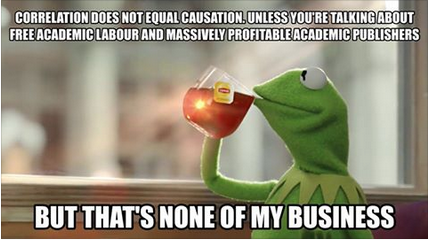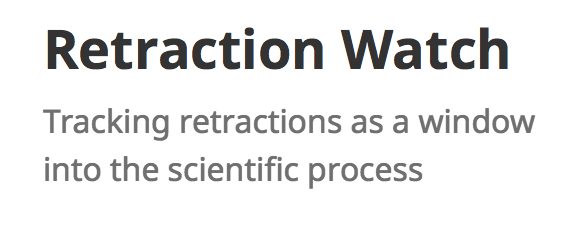newsoids
Various recent issues relevant to youcite
Some things to think about...

Journals market over $25 billion per annum, 30-40% profit margins - exploitation discussed

- See film: Paywall - the film
- See article commentary by Richard Smith from the Lancet (The business of academic publishing: "a catastrophe" Lancet: 2018, 392: 1186-7)
Retraction Watch site publishes most highly cited retracted authors and journal articles.

- Learn more: Retraction Watch web site
Scientists trick 4 dodgy journals into publishing an article on midi-chlorians

- See article: Midichlorians and Neuroskeptic
Scientists need to publish to survive, but this article argues this selectively leads to bad science. It is a compelling argument:
- Abstract
- Poor research design and data analysis encourage false-positive findings. Such poor methods persist despite perennial calls for improvement, suggesting that they result from something more than just misunderstanding. The persistence of poor methods results partly from incentives that favour them, leading to the natural selection of bad science. This dynamic requires no conscious strategizing—no deliberate cheating nor loafing—by scientists, only that publication is a principal factor for career advancement. Some normative methods of analysis have almost certainly been selected to further publication instead of discovery. In order to improve the culture of science, a shift must be made away from correcting misunderstandings and towards rewarding understanding. We support this argument with empirical evidence and computational modelling. We first present a 60-year meta-analysis of statistical power in the behavioural sciences and show that power has not improved despite repeated demonstrations of the necessity of increasing power. To demonstrate the logical consequences of structural incentives, we then present a dynamic model of scientific communities in which competing laboratories investigate novel or previously published hypotheses using culturally transmitted research methods. As in the real world, successful labs produce more ‘progeny,’ such that their methods are more often copied and their students are more likely to start labs of their own. Selection for high output leads to poorer methods and increasingly high false discovery rates. We additionally show that replication slows but does not stop the process of methodological deterioration. Improving the quality of research requires change at the institutional level.
- Read the full article here: Smaldino: Natural selection of bad science.
Have you ever wondered if it is possible to manipulate journal impact factors?
Here are two articles that might provoke further discussion (have a look at the reference list citations)...
- Example 1: Mrowka - Acta Physiologica.
- Example 2: Persson - Acta Physiologica.
From Nature Comments: An investigation finds that dozens of academic titles offered 'Dr Fraud' — a sham, unqualified scientist — a place on their editorial board. Katarzyna Pisanski and colleagues report. Nature 543, 481–483 (23 March 2017) doi:10.1038/543481a.
Peer review is becoming more and more problematic:

- Read the full article here: Examples of bad peer review and why it is damaging to researchers
The rise and rise of predatory fake journals...

- Read the full article here: Why you should care about the rise of fake journals and the bad science they publish
Overcoming the challenges of publication bias...
- Read the full article here: Publication bias: What are the challenges and can they be overcome?
The Gates Foundation now mandates open-access journals for publication of research by scientists who receive their grants. What does this mean for researchers in a world where grant money is hard to get and publications need to be in top journals?

- Read the full article here: Gates Foundation announces open-access publishing venture.